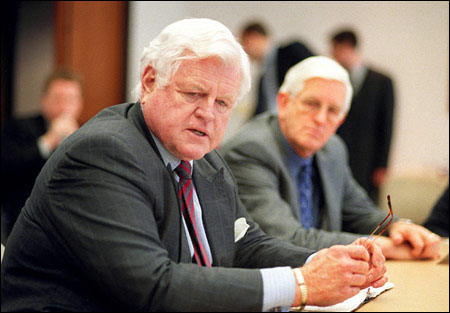Unknown feeds public fear of SARS:
Harvard Medical School hosts Kennedy briefing on mystery ailment

The mystery ailment known as severe acute respiratory syndrome (SARS) has the potential to spread rapidly in Boston’s unexposed population, but the biggest public health danger now may be fear, experts told U.S. Sen. Edward M. Kennedy Friday (April 4) at a briefing at Harvard’s Countway Medical Library.
Kennedy convened a briefing of 10 medical and public health experts from both inside and outside Harvard to gather the latest information on the fast-spreading illness. Cases of SARS have rapidly spread outside China’s Guangdong Province where it is believed to have first appeared in late 2002.
As of Monday (April 7), 98 deaths had been attributed to the disease out of 2,601 cases reported in 19 countries around the world, according to the World Health Organization. That’s an increase from Friday’s totals of 79 deaths out of 2,270 cases. As of Friday, there had been four cases reported in Massachusetts and no deaths.
Kennedy called the briefing ahead of Tuesday’s (April 7) U.S. Senate hearings on the illness, which has generated worldwide concern and has had economic as well as health effects. Several high-profile conferences have been cancelled and business travel to affected regions has fallen. The briefing included Harvard Medical School Dean Joseph Martin and Harvard School of Public Health Dean Barry Bloom.
The latest information on the illness indicates that it is a corona virus, the same family of viruses that include the common cold, though there is some indication that its effects may be worsened by the presence of other viruses. Like the common cold, the illness appears to be spread by close contact with someone ill with the disease, probably by inhaling particles suspended in the air after a patient coughs or sneezes.
SARS’ symptoms begin with a fever, usually greater than 100.4 degrees Fahrenheit and sometimes accompanied by a headache, body aches, or chills. After two to seven days, patients develop a dry cough and have trouble breathing, according to the U.S. Centers for Disease Control and Prevention (CDC). About 10 to 20 percent of cases need mechanical help breathing. The illness has killed about 4 percent of its patients.
Though the actual number of cases in Massachusetts has been small, the psychological impact has been large, especially in Boston’s Chinatown section, according to the Boston Health Commission Director for Communicable Diseases Anita Barry.
Barry said public health officials have been inundated by calls from a wide variety of people, from schools wondering whether to let a sick child attend to businesses wondering whether sick employees ought to return to work. She said Boston’s Chinatown section has been particularly hard hit. She said she fears an economic backlash there, as restaurant traffic has been reported down between 60 and 70 percent, even though no cases had been reported in Boston as of Friday.
“I think the biggest challenge with SARS right now is fear and rumor and panic,” Barry said.
Though fear may be a challenge, the illness itself poses a very real danger, according to Megan Murray, an infectious disease specialist at Massachusetts General Hospital and an assistant professor at the Harvard School of Public Health’s Epidemiology Department. Murray said the disease appears to be slightly more contagious than smallpox, with each single case infecting about five other people.
With that rate of spread, she said, most people would eventually get the disease in a population with no prior exposure. Numerically, that means that in a population of 1 million, about 900,000 would get the illness, with the epidemic peaking in about 150 days. With 4 percent mortality rate, that means about 36,000 people out of the 900,000 infected would likely die from the illness.
“You see rapid spread over time and most people get infected,” Murray said. “If these data were even close to correct, we could have a very serious global pandemic of SARS.”
That model, though alarming, represents a worst case scenario and doesn’t take into account the impact of quarantines or of potential new medical treatments and vaccines.
Several who attended praised the CDC and the world health community for its quick posting of information on the illness. Donna Fisher, an assistant professor of pediatrics at Tufts University Medical School and the physician who identified the first two Massachusetts cases, said it was the presence of reliable information that allowed her to make the link to SARS.
The cases occurred in Western Massachusetts in an adopted child brought back from China and in a close family member. Fisher said with the information at hand, they reacted quickly when a call came in from the family pediatrician.
“There was a huge piece of this that came to me with foreknowledge,” Fisher said. “We jumped all over this because the baby fit a case description.”
The usefulness of the case description – which provides guidelines for doctors diagnosing patients – may be in jeopardy as the disease spreads, according to Alfred DiMaria, director of the Communicable Disease Division of the State Laboratory Institute. DiMaria said a critical part of the case description involves travel from affected areas. As the illness spreads, tracing the contact back to China will become more difficult.
Scientists are studying the disease intently but said it takes months to develop a diagnostic test and much longer for a vaccine. In the meantime, participants said, there’s a need for information material in languages other than English and for more isolation facilities to separate SARS patients.
Kennedy said the briefing was very useful and that he’d take suggestions from the group to the CDC and National Institutes of Health. As for suggestions to the general public, Kennedy urged people to stay informed but not to panic.
“The danger of the disease is very real, but there’s a number of things that can mitigate that danger,” Kennedy said. “The level of anxiety among people in the greater Boston area is very intense.”




